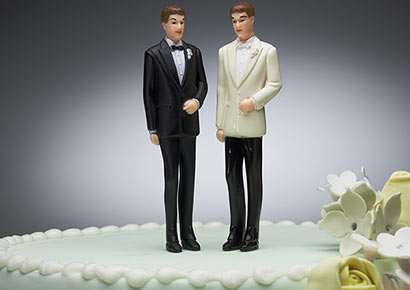Gay wedding cake ruling NOT a victory for religious bigots
 American LGBTQ activists insist that Monday’s US Supreme Court ruling in favour of an anti-gay baker was a minor setback that does not allow businesses to discriminate.
American LGBTQ activists insist that Monday’s US Supreme Court ruling in favour of an anti-gay baker was a minor setback that does not allow businesses to discriminate.
The court found that the rights of Jack Phillips, owner of Masterpiece Cakeshop, had been violated by the Colorado Civil Rights Commission, which in 2014 found him guilty of discrimination based on the state’s anti-discrimination law.
In 2012, Phillips refused to make a wedding cake for a gay couple, Dave Mullins and Charlie Craig. He claimed that he should be able to discriminate against LGBTQ people on religious freedom and freedom of speech grounds.
His views were backed by the Trump Administration which filed an amicus brief with the court in support of the anti-gay baker’s claim.
The case was seen as one that could have led the court to allow businesses to discriminate against LGBTQ people and others on the basis of owners’ religious views. But while the ruling was a relative victory for the bigoted baker, activists insist the decision did not change the law.
They pointed out that the court only threw out the earlier discrimination judgment against Phillips because of the biased way that the Colorado Civil Rights Commission handled the matter. Importantly, it did not block anti-discrimination laws from protecting LGBTQ people, as so-called “religious freedom” campaigners had wanted.
In fact, the court said that, “Our society has come to the recognition that gay persons and gay couples cannot be treated as social outcasts or as inferior in dignity and worth.”
It further ruled that while people are entitled to express moral and religious objections, “it is a general rule that such objections do not allow business owners and other actors in the economy and in society to deny protected persons equal access to goods and services under a neutral and generally applicable public accommodations law.”
Ryan Thoreson, from Human Rights Watch, believes that this is actually “good news for those who feared that the court would deal a death blow to nondiscrimination laws by creating a loophole for anyone who characterises their wish to discriminate as a moral or religious objection.”
Louise Melling, deputy legal director of the ACLU, which represented the couple, commented that, “The court reversed the Masterpiece Cakeshop decision based on concerns unique to the case but reaffirmed its longstanding rule that states can prevent the harms of discrimination in the marketplace, including against LGBT people.”
HRC President Chad Griffin agreed. “Anti-LGBTQ extremists did not win the sweeping ‘license to discriminate’ they have been hoping for,” he said.
He and others called on Congress to pass the Equality Act, which would update federal civil rights laws to specifically provide protection from discrimination on the basis of sexual orientation or gender identity.
“The fact remains that LGBTQ people face alarming levels of discrimination all across the country,” said Griffin, noting that LGBTQ people are at risk of being fired, evicted or denied services in the 31 states in the US that don’t have laws protecting LGBTQ people.
Melling added: “No one should have to face the shame, embarrassment, and humiliation of being told ‘we don’t serve your kind here…”
Leave a Reply